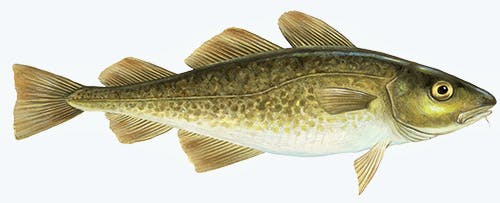Protein: Atlantic cod require a high-protein diet, typically consisting of around 45-55% protein to support their rapid growth. Protein sources are often derived from fish meal, fish oil, and plant-based alternatives.
Fat: The diet contains 15-20% fat, with a focus on omega-3 fatty acids to promote healthy growth and produce high-quality flesh.
Vitamins and Minerals: Essential vitamins (A, D, E, B-complex) and minerals (calcium, phosphorus, magnesium) are crucial for overall health, bone development, and metabolic processes.
Sustainable Alternatives: As the industry moves toward sustainability, fish farmers are increasingly incorporating plant-based proteins (like soy) and reducing reliance on marine ingredients, while ensuring the nutritional balance remains optimal for cod health and growth.

Atlantic cod
Atlantic cod (Gadus morhua) is a cold-water fish native to the North Atlantic. It is a key species in commercial fisheries and aquaculture due to its high market demand, white flesh, and mild flavor. Cod are typically farmed in colder climates, like those found in Norway, Iceland, and Canada. Atlantic cod farming is gaining traction as a sustainable alternative to wild fisheries, offering a reliable source of healthy, high-quality seafood for consumers around the world.
Feed programs
Configure the parameters below and download the data sheets you need for your species.Configurate parameters
Choose one or multiple feed sizes below
Choose a feed format below
Download data sheets
PerformanceGoodHigher
Select options to access data sheets.
Choose a size on the left hand side.In the words of our partners
The inspiring journey of growth of Norcod, cod producer in Norway, and Aller Aqua, as the trusted partner in feed solution.
Optimizing cod nutrition
Optimizing cod nutrition: Aller Aqua and Havlandet partner up to improve feed nutrition with tailored-made feed for cod.